This International Women’s Day we’re celebrating women in technology with our list of the 7 most influential women in tech of all time.
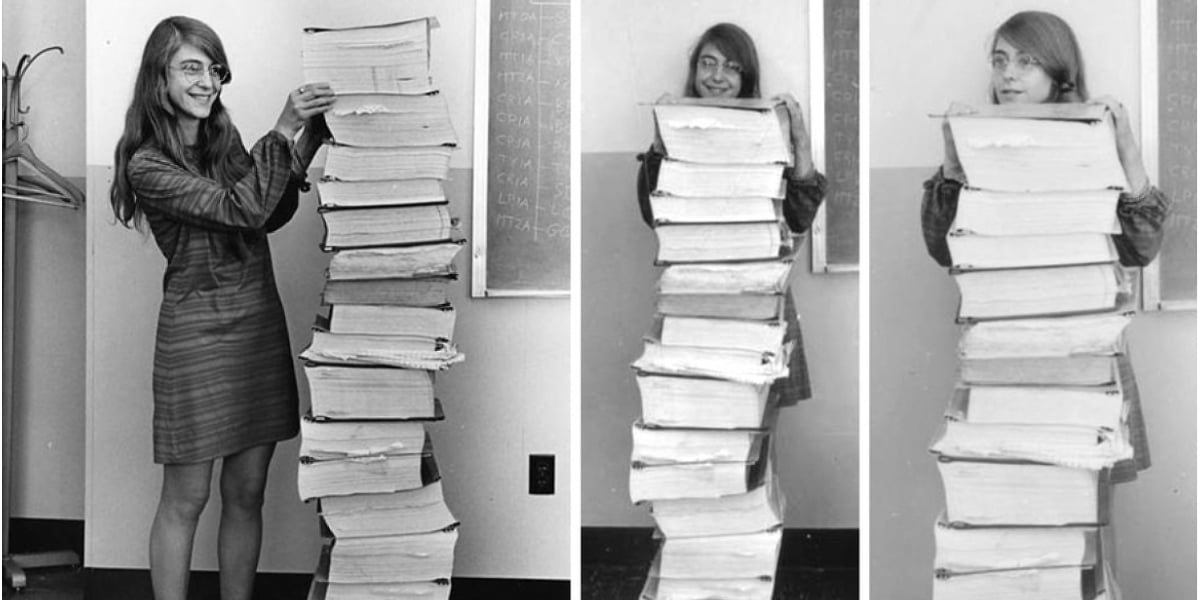
Computer scientist Margaret Hamilton poses with the Apollo guidance software she and her team developed at MIT
Photo: MIT Museum
This year’s International Women’s Day, which takes place on March 8, has the theme #InspireInclusion. The idea is to celebrate women’s achievement, raise awareness about discrimination, and take action to drive gender parity forward.
As we always write every year, the world has made progress but much, much more is still required. According to the latest figures from the World Economic Forum, at the current rate of progress it will take another 131 years for women to reach full gender pay parity. Women, as of June 2023, are paid 68.4% less than men for the same job. The good news is that that figure is back to its pre-pandemic levels (Covid impacted women in the workplace far more than men). The bad news is that it will still be the year 2154 before parity is reached.
And that is just economic parity. It says nothing of the concepts of equality and inclusion that need to be factored in to the whole process and which are still far from equal.
As the IWD website itself says, “When women aren't present, we must ask: "If not, why not?” When women are discriminated against, we must call out poor practice. When the treatment of women is not equitable, we must take action. And we must do this each time, every time.”
We are proud to do this at VO. The many fabulous women in our team have led from the front for us over the past year, cementing themselves as industry thought leaders and being front and centre in all discussions at all levels of the business. We have always seen equality as a fundamental part of working for VO, and we shall work hard to continue the process.
So, with that in mind, we thought it would be a good time to take a look at the women who have inspired us. The technology sector definitely has its own foibles when it comes to gender parity, but it is fair to say that a lot of it would not exist in its current shape or form at all if not for these seven pioneers in our list below, many of whom had to battle all manner of different prejudices to get their voice heard.
The 7 most influential women in tech
1. Ada Lovelace: 1815 - 1852
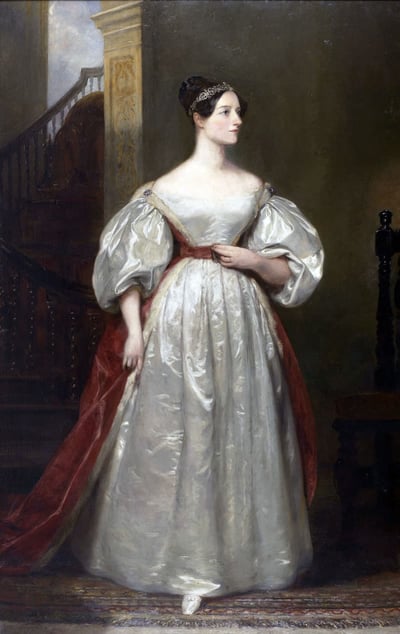
When Nvidia unveiled its latest graphics processing unit (GPU) in 2022 and called the architecture Lovelace after the Victorian English mathematician, it helped seal the deal on a forty year journey celebrating Ada Lovelace’s pioneering work in the science of computing that started with the naming of the Ada computer language in 1980. Effectively she is considered the first computer programmer, reasoning that her friend Charles Babbage’s proposed (but never completed) Analytical Engine could be used to follow a program to calculate Bernoulli numbers in 1843.
2. Grace Hopper 1906 - 1992
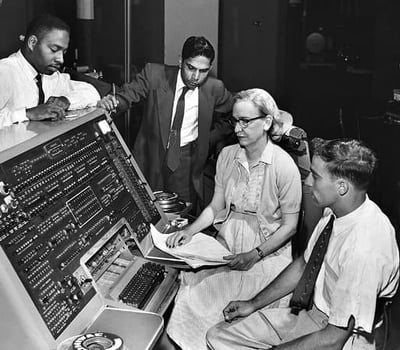
Nvidia also named a chip after the second woman on our list, Grace Hopper. Rear Admiral Grace Hopper was an American mathematician in the US Navy who had a pioneering role in developing computer technology. This included helping to devise UNIVAC I, the first commercial electronic computer, and writing the first English-language compiler, a key component in computing workflows that translates a programmer’s instructions into computer codes. This went on to be a key part of the development of the COBOL language, a compiled English-like computer programming language designed for business use which underpinned mainframe development during the 1960s and, while outdated, is still in use to this day by many business and governmental organizations. As recently as 2017, it was estimated that 43% of banking systems still used COBOL.
3. Katherine Johnson 1918 - 2020
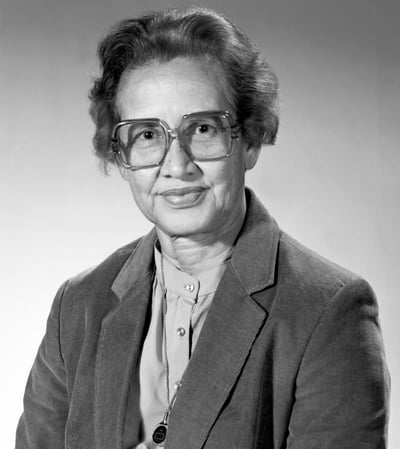
As well as computer science, another area where women have made significant and recognized contributions has been space research. Partly this was due to many organizations of the time — NASA, Bletchley Park in England, and many others — effectively hiring women as ‘human computers’. One of the most famous of these was Katherine Johnson, who had to overcome the constraints of segregation and gender bias in her storied career. She became adept at calculating orbital trajectories and famously, for John Glen’s 1962 orbital mission, Glenn insisted she run the numbers for his orbital calculations by hand to see if they matched those provided by NASAs new mechanical computers. “If she says they’re good,” she remembers the astronaut saying, “then I’m ready to go.”
4. Annie Easley 1933 - 2011
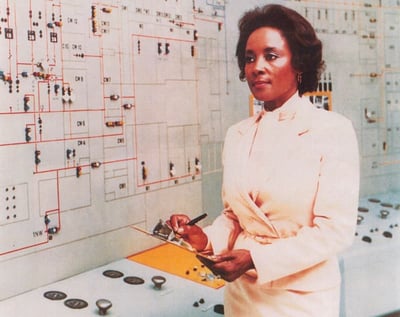
Annie Easley was an African American computer scientist and mathematician who made many contributions to NASA's rocket systems and energy technologies over her lengthy career. A decent proportion of this was spent looking at alternate technologies to the rocket systems, and her research was used in early hybrid vehicles and NASA's Centaur upper-stage rocket. Her influence extended way beyond this though. As a NASA bio says, “She would contribute to numerous programs as a computer scientist, inspire many through her enthusiastic participation in outreach programs, break down barriers for women and people of color in science, technology, engineering, and mathematics (STEM) fields, and win the admiration and respect of her coworkers.
5. Margaret Hamilton 1936 -
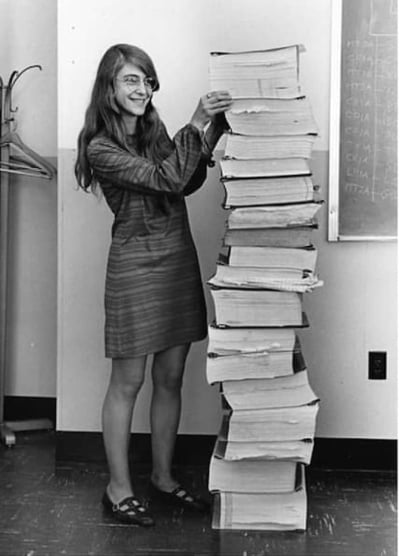
In 1961, NASA contracted the MIT Instrumentation Laboratory to develop the Apollo mission program’s guidance system. Computer scientist Margaret Hamilton, led the Software Engineering Division there, and in 1969, a photographer took a picture of her standing beside the tower of code developed by her and the team for the missions. The photo has become deservedly iconic, and is a testament to not only her skill and expertise — she is also credited with coining the term ‘software engineering’ — but also the sheer effort that was required to write code. “Looking back, we were the luckiest people in the world; there was no choice but to be pioneers,” she has said.
6. Adele Goldberg 1945 -

Another computer scientist, Adele Goldberg was one of the co-developers of the programming language Smalltalk-80 while a researcher at the Xerox Palo Alto Research Center (PARC), in the 1970s. PARC has had a huge impact on the development of computing, and many of the elements that we have come to associate with the personal computer originated there, but Goldberg’s has been one of the more far-reaching. Many of the concepts her and her team developed while creating Smalltalk and after became the basis for the modern graphical user interface (GUI), and a demo she provided for Steve Jobs at Apple Computer would be hugely influential in the development of the Apple Macintosh.
Here’s an extract from The Triumph of the Nerds that aired on PBS in 1996.
Adele Goldberg: “[Jobs] demanded that his entire programming team get a demo of the Smalltalk System…and I said no way. I had a big argument with these Xerox executives telling them that they were about to give away the kitchen sink and I said that I would only do it if I were ordered to do it cause then of course it would be their responsibility, and that's what they did.”
Steve Jobs: “Basically they were copier heads that just had no clue about a computer or what it could do. And so they just grabbed defeat from the greatest victory in the computer industry. Xerox could have owned the entire computer industry today. Could have been, you know, a company ten times its size.”
7. Radia Perlman 1951 -
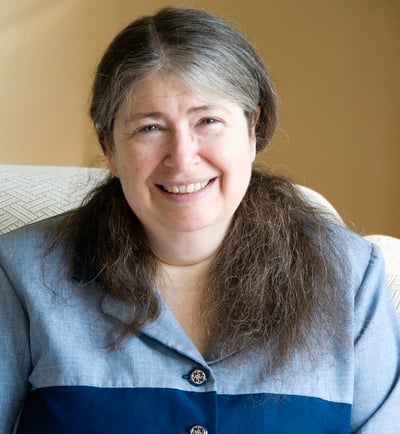
In the 1980s Radia invented the spanning tree algorithm and the spanning tree protocol, more often simply known as STP. STP is fundamental to the way that network bridges work, essentially being a traffic system that plots a single active path between network nodes and while providing automatic backup paths if that active link fails. She has also made many other important contributions to the areas of network design and standardization and holds over 80 patents, but for her work on STP she is simply known as the ‘Mother of the Internet’.
The influential women of the 21st century
There are many others beyond these seven too, and other people would probably come up with a different list. We also kept our focus narrowly on tech; expand it out to the field of science and you have a whole new set of names including Marie Curie, Dame Jocelyn Bell Burnell, Rosalind Franklin, Jane Goodall, Rachel Carson, and many more.
But we stand on all their shoulders and the battles they fought, and we are now delighted to be helping the influential women in tech of the 21st century in all of their efforts.

